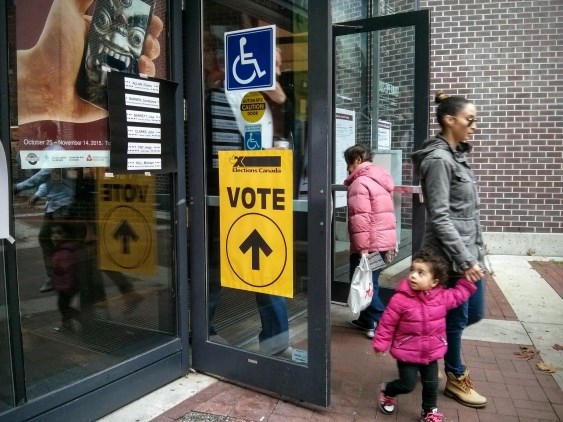They say every minute counts and every vote counts, but did one of the polling stations that suffered a ballot-shortage during last year’s civic election stay open a tad too long?
City of Vancouver adopted a “vote anywhere” policy for the Nov. 15, 2014 election to encourage higher turnout after years of assigning voters to their nearest school, church or community centre to prevent multiple voting.
Voting at four of the 117 stations was extended beyond the 8 p.m. deadline after running out of ballots. City hall’s communications department announced the extensions in a 7:41 p.m. news release for Killarney Community Centre (to 8:15 p.m.), Britannia Community Centre and Oakridge Centre (to 8:30 p.m.) and Hastings elementary (to 8:45 p.m.). Voters who lined up inside or outside voting stations by those times were allowed to vote.
The news release had been drafted since at least 7 p.m., according to documents released under Freedom of Information. Several of the messages between then-city manager Penny Ballem, communications staffer Marnie McGregor and city solicitor Francie Connell under the subject “Current Draft Messages on Poll Closing Times/Potential Extensions” were censored under an exception for policy advice.
When the draft was sent to Janice MacKenzie, the city clerk who doubled as chief elections officer, she responded at 7:31 p.m.: “I’m good with the language but Killarney is now admitting that they were without ballots for less than 10 minutes.”
Killarney’s 15-minute voting extension was made official in the 7:41 p.m. news release.
“Well done all,” Ballem wrote at 7:46 p.m.
By 9:05 p.m., the polls had been officially declared closed and chief digital officer Jessie Adcock was free to begin publishing results.
A city hall observer said it is a conflict of interest for civic elections to be run by an office inside city hall. Independent agencies oversee federal and provincial elections in Canada.
“Having a city employee as a chief election officer is quite a failure in terms of independence of the election,” said Randy Helten of the CityHallWatch.ca blog. “One example of the lack of checks and balances in the City of Vancouver.”
Earlier in the day, officials of the two main parties emailed MacKenzie with concerns about lineups and delays. At 12:31 p.m., Vision Vancouver executive director Stepan Vdovine wrote that scrutineers were reporting wait times of up to 40 minutes at Strathcona and West End while other locations, like Wosk Centre, were “underutilized.” “I am concerned that voters will be discouraged to vote if arrangements are not made to reassign staff and reduce wait times,” Vdovine wrote.
NPA election day director Gavin Dew sent MacKenzie an urgent 6:23 p.m. message, asking about extended voting times. “Our understanding is that numerous polling places have been intermittently running out of ballots and, as a result, voting has been delayed. We understand that in some instances there have been periods of up to an hour with no ballots on hand at voting locations. In light of the delay for voting, could you please confirm that voting will be open at affected locations past 8:00pm, provided that people are in line? Please confirm ASAP, as my legal team is standing by to initiate more formal correspondence.”
Dew had earlier complained about Vision Vancouver sending out five get-out-the-vote messages by email. “Please tell me by 3 p.m. if you plan to enforce the law. If not, we will assume that you are not enforcing this law, and we will begin doing the same,” Dew wrote to MacKenzie.
MacKenzie responded at 2:31 p.m.: “Elections BC oversees the local expense campaign financing act. This matter falls within their jurisdiction.”
Elections BC did not act on complaints about the Vision Vancouver email because it deemed it a communication to party members — even though it was received by citizens who said they were neither party members nor donors.
Vdovine reported in separate complaints that “dozens of signs” for COPE, Green Party and One City along the perimeter of voting stations at Strathcona Community Centre, St. Augustine’s school at the wrong address and wrong place on the voting map, and that the mobile version of the city’s website showed voting day was “on tomorrow.”
Mayor Gregor Robertson won a third term and his Vision Vancouver retained its majority on city council, but lost its majorities on park board and school board. Turnout rose from 34.57 per cent in 2011 to 43.4 per cent in 2014, as voters cast 181,707 ballots from an inventory of 279,200. Voter registration fell from 418,878 in 2011 to 415,978 in 2014. Another 6,009 were eligible to vote for school board only on the University Endowment Lands, down from 6,478 in 2011.
The 2014 election was the first to expand terms from three years to four. The next scheduled civic election is Oct. 20, 2018.
@bobmackin



